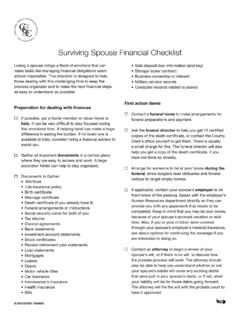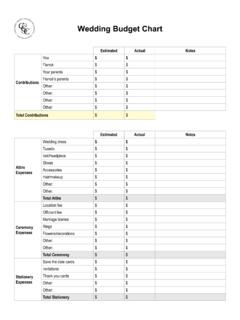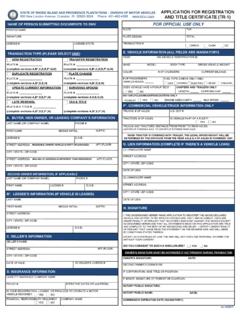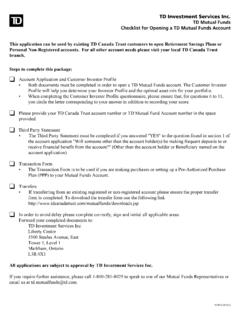Transcription of Surviving Child Financial Checklist - CCCS of San …
1 2012 CCCSSF / REV0912 Surviving Child Financial ChecklistWhen a parent passes, the loss of a loved one can be made more difficult with the weight of trying to organize the Financial affairs of the departed. This Checklist is meant to give you a plan for handling the decisions that need to be made and the issues that need to be resolved for your steps This is a lot for one person to handle alone, so get assistance. Enlist the help of other family members if possible. Locate the original will, not a copy, if there is one. If not in a lockbox at home, it may be with a lawyer or in a safe deposit box. Find out if you were named executor in your parent s will. If so, you will be responsible usually with the help of an attorney for distributing your parent s assets.
2 Use a large accordion folder to store all the important documents you will need. Locate copies of important papers, like: Will/trust Birth and marriage certificates Divorce records Death certificate (if you already have it) Funeral instructions or contracts Credit card statements Mortgages and statements Insurance policies Investment records and stock certificates Tax returns from the past two years Retirement fund or pension statements Employer benefit information Social Security card and statements Bank statements Safe deposit box information Storage locker information and key Business ownership or interest information Military service records Union membership information Titles/deeds BillsFirst action items Contact the funeral home.
3 They can help you get copies of the death certificate. You can also get copies at the county clerk s office. Get at least 6 certified copies. If necessary, contact the utility companies to have the utilities shut off at your parent s place of residence. If your parent has a Surviving partner or spouse, make sure the utilities and other bills or accounts get transferred into that person s name. Contact a local attorney specializing in estate issues. There may be a temptation to try to go it alone, but making mistakes could cost you a lot more than the deceased s estate would have paid an attorney. You could even be fined if you improperly execute the distribution of assets. If possible, try to work with the attorney who drew up your parent s will.
4 If that attorney is not available, contact the state s bar association for a referral. Make a special point to talk with the attorney about any secured debts your parent had and what options are available for handling those. While an attorney can guide you through most of the executor duties, it will make things easier for you if you make a commitment to communicating all pertinent information to anyone who is named in the will/trust. This helps to avoid confusion or hard feelings going forward. Contact the life insurance company that holds your parents policy to begin the processing of the claim. Also contact any insurance companies your parent had a policy with to notify them of the passing and see if any cash benefits are due to CCCSSF toll-free or visit action items Contact your own tax professional for estate taxes, inheritance taxes or other types of income that could be an issue come tax filing time.
5 If you are going to be taking on your parent s car or mortgage payments, contact your insurance provider to talk about coverage for these. Your parent will need to file taxes for the year of passing, so try to determine if there is a tax professional your parent had already been working with. If not, use one local to your parent s home to help with the filing. Contact a Financial advisor before moving around any large sums of money you receive from your parent s estate. Get in touch with any Financial institutions where your parent had accounts to notify them of the passing. Reach out to your parent s creditors to inform them of the passing. Remember: you do not inherit your parent s debt, unless you were a co-signer or joint accountholder.
6 Also, being an authorized user for a debt doesn t make you legally responsible for paying it back. If you are contacted by collectors for medical bills or other debts, refer them to the attorney helping you administer the estate. Remember that generally speaking, unless you were a signed guarantor of a debt with your parent, you are not responsible for their debts. If your parent was still working, contact the employer s Human Resources department. Learn what benefits are due, whether it is in wages, a company life insurance policy, a retirement plan, unused sick or vacation time, etc. Also contact any former employers you are aware of to learn if any pensions or other benefits are due. Lastly, contact the Veteran s Administration if your parent was in the military, or any labor unions they may have belonged to.
7 Last action items Contact the Social Security Administration, even if your parent was not receiving benefits. Survivors may be due benefits. Also contact any other government agencies from which your parent may have been receiving benefits. Contact any unions or community organizations your parent was a part of to inquire about any benefits they offer. Contact the Veteran s Administration if your parent served in the military. Protect your parent s identity: Shred documents that are no longer needed Fill out a change of address form to have mail forwarded to you Avoid making death announcements of any kind via social media Keep the obituary brief and don t include vital information like date of birth, address, place of birth, etc.
8 Call the federal Opt-Out phone number at so that pre-approved offers are no longer generated for, or sent to, your parent. Cancel newspaper subscriptions so potential thieves aren t tipped off to an unoccupied living space. Contact the credit bureaus to let them know your parent is deceased and to put a statement on their credit file to reflect that: Equifax, Experian, TransUnion, If your parent left behind a large quantity of household items or collectibles, contact a company that can conduct an estate sale. Make sure there isn t any cash tucked away in items you put up for sale.








